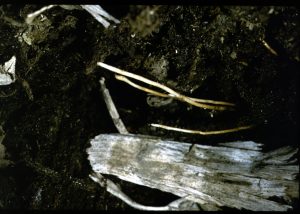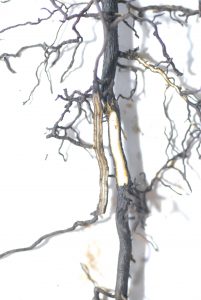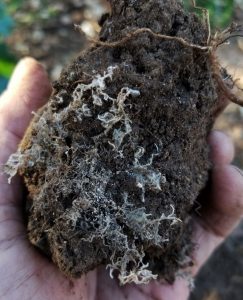Roots are the unsung heroes of plants! But unfortunately your every day hard working root gets little respect from gardeners. “We are so taken for granted” whined Radix– “Its just so hard, we are all down here in the dark, nobody see’s us, we get no admiration, yet we work so hard!”. Radix is your every day “working root” mostly ignored by gardeners. Even though the seasons change, and leaves come and go, Radix is growing most all the time! Gardeners love the color of flowers, the texture and shape of foliage, the architecture of tree tree branches and admire all the things plants do above ground. They beautify the world, provide us food, and provide oxygen for us to breathe. We heap our admiration on above ground functions of plants, but without Radix, and all the other roots, the above ground parts would perish.

Growing plants is about growing the whole organism. We may pick the fruit, admire the flowers, or rest under the shade, but none of it would be possible without proper care of root systems. Roots have varied functions—they provide anchorage so the plant can stand upright; they absorb minerals and water; and they store energy in form of starch. Plant shoots grow in the realm of light and much of their adaptations revolve around catching sunlight. Their atmosphere is mostly nitrogen and oxygen. Roots grow in the realm of soil and darkness, their atmosphere is oxygen restricted and dominated by carbon dioxide and even toxic gases like sulfur dioxide, and methane if soil conditions become saturated. Just like all parts of plants, oxygen is required by roots to respire or utilize chemical energy for their growth. Poor Radix can choke if the oxygen supply is limited.
Shoots live in a herbivorous world. Plants get eaten by animals. Because they have buds of all kinds they can grow back, leaves may contain alkaloids and other molecules that reduce herbivory, and plants can arm themselves with spines, thorns and prickles, but roots live in a microbial world. While microbes can grow on most plant surfaces, the root system is bathed in microbes (the soil food web). Not only do roots have to defend themselves underground but they have specific alliances that let them do that! As you know from some of my other blogs, root pathogens can kill all ages of plants from seedling to mature oak trees. The happens when pathogens (which are opportunists) are not well regulated by soil microbes, or when plant root systems are stressed in some way. Large populations of soil bacteria, fungi, nematodes and arthropods limit the development of opportunistic pathogens. These organisms are supported by soil carbon or organic matter which is essential to their abundant reproduction in soil. This carbon is best supplied to root by mulching with freshly chopped Arborist chips.

Roots store carbohydrates made in leaves as starch. This stored energy can be used for their growth or redistributed through the plant later. In order for stored starch to be used, it must be converted back to glucose (by enzymes) and then broken down through chemical respiration. These processes take oxygen which is limited in soil as a function of depth. The deeper you go the less oxygen. This is why trees and most plants have roots in the upper foot or so of soil. This upper foot of soil is sensitive and fragile. It can be compacted by foot traffic or equipment and lose oxygen content. Weed barriers, fabrics, and sheet mulching deprive soil of gas exchange, and the amount of carbon dioxide increases at the expense of oxygen under these barriers. Too much water can fill soil pore spaces causing saturation that usually contain oxygen and decrease the amount of available oxygen since it does not dissolve well in water. All of this also applies to the soil microbial communities which also require oxygen to grow and thrive.

So how do we respect Radix and all the other hard working roots? Promote soil health by avoiding tillage and cultivation. Use Mulches made from fresh tree trimming chips, avoid compacting soils with machinery, and do not shock soils with excessive application of manure, fertilizer, or water which can perturb the microbiology of a soil. I also suggest you learn to admire roots for all that they do for plants in your garden. Check in with Radix every now and then by digging down and looking at root systems. See if they are growing. Try to learn the seasonality of peak root growth so that you avoid practices that may harm roots during their critical growth periods. Be alert to the symptoms of root rot on garden plants especially at the tops of plants such as leaf drop, shoot dieback and wilting.
This is AAA info—short, clear, coherent, comprehensive, fundamental and SUPER IMPORTANT.
Thank you for this very informative, useful article.
A question: We have a (huge!) balsam poplar tree in our backyard. From what I understand it’s allelopathy suppresses Frankia bacteria, vital for some plants’ roots (symbiosis) uptake in Nitrogen. We’re talking a small suburban backyard here, with the culprid tree’s canopy covering 25% of available surface. It’s crippling to our 800 sq. ft. veggie patch, which would otherwise generously provide for most of our family’s veggie needs.
Cucumbers, squashes, lettuces and lots of our plants grow into scrawny, deformed little plants, with terribly bitter fruits or leaves.
Will supplementing our beds with lots of Nitrogen, synthetic or otherwise, help getting healthy cucurbits, letuces, etc.
What can we do, other than paying 4000$ (we don’t have) to have it removed?
Thank you!
I’ll let Dr. Downer also answer, but there is no evidence of allelopathy in the field. More likely you have an issue with competition for water and/or nutrients. Mulch the bed well with coarse organic matter, and use lots of supplemental water.
Here’s a fact sheet on the allelopathy question. It’s on black walnuts but the science expands to all species. https://pubs.extension.wsu.edu/do-black-walnut-trees-have-allelopathic-effects-on-other-plants-home-garden-series
Many thanks to you, and thanks in advance to Dr. Downer for his input.
When we noticed some veggies performed perfectly well (tomatoes, beans…) while others where totally crippled in growth and health (squashes, cucumbers, lettuces and other greens…), we researched what could be the cause. We discovered Balsam poplar demonstrated allelopathy to certain species of plants.
It’s important to tell you we have the same discrepancies in health and performance with ornamental plants. Roses have zero chance in our garden, while many other flowering bushes are performing as expected.
“Leachates from balsam poplar negatively affected nodulation and infection by Frankia involved in nodule formation, thereby influencing microorganisms associated with the nitrogen cycle (Thibault et al. 1983)”
The above quote from the document “Ecology, management, and use of aspen and balsam poplar in the prairie provinces” got our attention. So we tried to find more info on Frankia and found that Wikipedia had a list of Symbiont plants in their entry for Frankia bacteria, among which some are commonly grown in gardens. Notably in the roses and cucurbits families.
Then we discovered this study. https://cfs.nrcan.gc.ca/publications?id=14433 which, coupled with our experience in our garden, convinced us we are effectively dealing with an allelopathy problem.
I realize this is a very specific question, probably not easy to answer it too. But a vegetable garden in super important for our family food supply, we are not leisure” veggie gardeners. The veggie patch helps tremendously our budget even well into winter (canning, freezing). So I’m *very* grateful for any information, suggestions.
There is a difference between running an experiment in the lab and one in the field. I have reviewed the literature, exhaustively, and can tell you there is no current, peer-reviewed infomration supporting the phenomenon of allelopathy in any field situation. Use more water and mulch well. It’s an issue of competition.
This is ggod news. Much easier to deal with competition than with allelopathy. We’ll head your advice this season. Thank you.
You are most welcome! Good luck!!